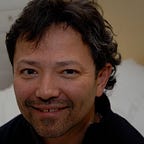Deleuze and Pragmatism 2
Perspectives on Deleuze: A Practical Dialectic
Theories
Gilles Deleuze’s vision for the process of thinking has much in common with a number of modern philosophical visions, including Pragmatism.
For the pragmatists, truth is not universal and objective.
Truth is what works.
Further, we do thinking: theories are tools and instruments that are addressed to certain problems, problem-solving, and never static solutions.
Theories are always fallible, always capable of being wrong, capable of being replaced with new theories that are more illuminating in relation to problems that evolve over time.
Models
The point is to create models to stimulate more thought.
Models can be useful and some have consistency and coherence over others, but none can ever claim transcendent truth, whether this is in the fields of science or ethics.
Models cannot be foundational in the sense of having some sort of ground in an objective beyond scrutiny.
They can be based on a form of reasoning, but not exclusively and not one that would aspire to universal objectivity.
Models can be based on other things, all of the perspectives a human being might bring to any problem: feelings, relationships, commitments, desires. And models are couched in language that itself has no concrete stability, but is also always in a state of becoming.
Thought does not mirror reality, for reality continues to shift.
Fallibility
Pragmatists believe that theories can be justified based on their consistency and coherence internally, and amongst other theories, that form a body of thought.
Truth is always contingent. And there is always more than one way to create concepts that attempt to explain reality.
Theories are instrumental, subject to ongoing verification and fallibility in relation to their potency or forcefulness in addressing problems we encounter within the empirical world, ie., the immanent field.
And this applies beyond the sphere of science into ethics:
Good values are useful values, values we create and uphold because they address problems.
Thinking as Process
We can see the similarities with a constructivist approach to reality, thought, and ethics:
Concepts and values are created in a process of becoming, at moments in time useful, at other times outliving their usefulness.
Thinking is a doing process, at all times contingent on setting and the problems that need to be addressed.
And on closer examination, we find a distinction surfacing in this approach to thought:
Sometimes we think in a private setting, and sometimes in a public setting.
That is, real thought always affirms life and nature, but sometimes our thought evolves in a personal manner, on other occasions it necessarily must evolve socially, and politically.
Enter Deleuze and Guattari
Implicitly, Deleuze recognizes this distinction. His later work with Félix Guattari applies his immanent philosophy of difference to the social and political, as well as to a number of natural registers beyond.
Deleuze’s overriding view of thought is never that it is a question of “what is,” but instead, “how, when, where, under what circumstances.”
Thought that personally and privately affirms may not always be thought that is remarkable in a social and public sense, and vice versa. Affirmation of life in the private sphere may not always coincide with the affirmation of life in the public sphere.
Concepts are constructed to address specific problems in particular situations and settings. In some situations our thought serves to affirm a personal vision of life; sometimes we must take those same affirmations into the social sphere and find ways to address problems that inherently are social or political.
Thought Always Unfinished
This is not an attempt to slip into Deleuze’s ethical vision a transcendent morality, objective rules of what one can and cannot do; negativity based in abstraction, all of which he rejects.
Instead, it is a recognition that Deleuze would have defended a social decision-making process that is immanent, life-affirming, based in pure difference and repetition, and always in a process of becoming.
I hope you enjoyed this article. Thanks for reading!
Tomas
Please join my email list here or email me at tomas@tomasbyrne.com.
Excerpt from my forthcoming book, Becoming: A Life of Pure Difference (Gilles Deleuze and the Philosophy of the New) Copyright © 2021 by Tomas Byrne. Learn more here.
